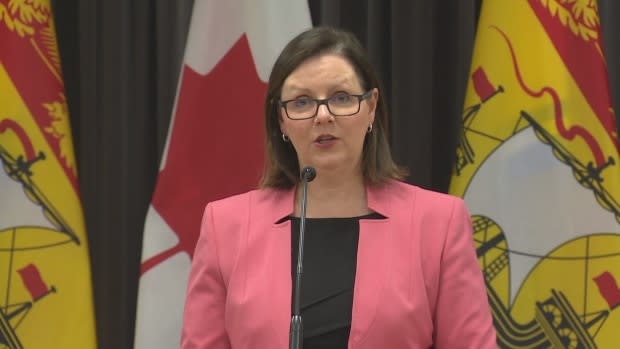New Brunswick has enough COVID-19 supplies if used 'appropriately'

New Brunswick Premier Blaine Higgs and chief medical officer of health Dr. Jennifer Russell both say they're confident the province will have enough medical supplies to deal with the COVID-19 outbreak.
But the supplies will have to be used "appropriately" and protective equipment must be prioritized for health-care workers, who will be instructed on "judicious use."
Higgs and Russell are also counting on the federal government to come through with more supplies as the pandemic progresses, they said during Wednesday's daily update in Fredericton.
Russell announced 11 new cases of COVID-19, bringing the province's total to 81.
She also announced seven of the total cases involve health-care workers.
"This is precisely the type of situation we must avoid," said Russell. "As I've mentioned numerous times before, health-care workers are the ones who will be saving the lives of those who become ill with the disease."
Public Health confirmed earlier this week that the virus is now spreading in the province through community contact, not just travel, but Russell urged citizens not to "obtain or use" the masks intended for the health-care sector, known as N95 masks.
"In the current situation public masking by the general population is not necessary," she said.
"But health-care workers do need masks to safely carry out their duties and their needs have to come first."
Even health-care workers must use the personal protective equipment (PPE) "wisely," however, said Russell.
She has been in contact with the Horizon and Vitalité health authorities, Ambulance New Brunswick and other health agencies this week about "advising health-sector employees on the judicious use of PPE supply."
Public Health officials have also informed WorkSafeNB and the various unions that represent the workers, she said.
Our current stockpile is at the desired inventory based on the moderate level of pandemic influenza scenario and we are working with the federal government to obtain more as the pandemic progresses. - Jennifer Russell, chief medical officer of health
"I'm confident that we can continue to collaborate with all of our partners to meet this challenge — and it is a challenge. It's a very, very real challenge," she said, pointing to the experiences of some other jurisdictions.
"We have enough supplies on hand to meet our current needs," Rusell told reporters.
"Our current stockpile is at the desired inventory based on the moderate level of pandemic influenza scenario and we are working with the federal government to obtain more as the pandemic progresses."
New Brunswick's first allocation from the federal government is "en route" to the province's emergency stockpile warehouse, she said.
"We are committed to ensuring that our frontline health-care workers are appropriately protected so they can do their job safely."
'Doing everything within our power'
Higgs acknowledged the concerns of health-care workers regarding access to adequate personal protective equipment.
"I can assure you that the government is doing everything within our power to make sure we have the supplies we need," he said.
On Tuesday, Prime Minister Justin Trudeau announced $2 billion to produce necessary supplies, including ventilators, testing kits, and personal protective equipment, such as masks, face shields, gowns and hand sanitizers.
"We will continue to work closely with the federal government and the other provinces to ensure we have access to these supplies in New Brunswick as the demand increases and we have been assured by the federal government that we will have the necessary supplies available to us," said Higgs.

But he stressed the importance of properly managing the existing resources.
"If we don't do that then we run the risk of not having the right equipment for the people that need it the most. And that's why the caution."
Russell said if New Brunswickers want to protect the people who protect them, the best thing they can do is stay home.
"Staying home will save lives," she said.
It will mean fewer infections, less spread of the virus, fewer patients needing urgent medical care, and fewer deaths.


